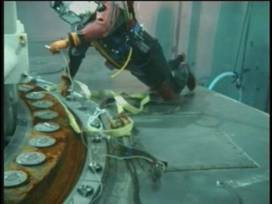Nuclear power plant maintenance requires SCUBA divers in the rivers and oceans near the intake pipes and, as the image shows, in the reactor itself. And the men and women who work as employees and contractors for the plants and for Underwater Construction Corp, UCC do the job (more images).
According to Katheryn Kranhold, here, of the Wall Street Journal and Pittsburgh Post Gazette, “Divers are in great demand these days. Power companies need them to maintain many of the world’s 442 nuclear reactors. They’re also called on to repair aging bridges and water tanks…. That has done little to increase pay for nuclear divers, who start at salaries of about $30,000 a year.”
What are the risks of this work over and beyond the risks of SCUBA diving? What are the protections afforded the workers? What insurers underwrite the risks? And who purchases the insurance? The divers? Their employers? The nuclear plant operators? Or the sub-contractors who hire contract divers (at $20 per hour)? How many hours per year do the divers work, and can they afford the insurance? And if they can afford the insurance, do they actually buy it?
David Goodwillie, writing in Popular Science, reports on the chilling occupation of nuclear divers in Swimming On The Hot Side excerpted below.
What kind of person knowingly dives in contaminated water? I spent months sending queries to divers I found online, but none of them would talk either. Then came the Fukushima disaster, which changed the nuclear-energy landscape almost overnight. On a hunch, I started contacting plant operators rather than individual divers. An article about the hazards (and heroics) of nuclear diving might not be a plant manager’s idea of great publicity, but it sure beat images of helicopters dumping seawater on crippled Japanese reactors. Someone at the D.C. Cook nuclear power plant in Bridgman, Michigan, agreed. More than a year [later,] I was invited to see a dive in person.
[imagebrowser id=99]
Making the bargain even more complex is the fact that construction on every one of the country’s 65 working nuclear plants began before 1978. In the years that followed, tough economic times, a burgeoning environmental movement and the near-catastrophic meltdown at Three Mile Island in Pennsylvania combined to bring an end to the permitting and financing of new plants. The nuclear-energy industry limped along for most of the next three decades, supplying only about 20 percent of the nation’s power. But as fossil fuels fell increasingly out of favor and nuclear energy gained support in Europe and parts of Asia, George W. Bush and then Barack Obama began speaking of nuclear power as a crucial component of any new national energy policy. At the same time, bipartisan support for nuclear energy was steadily rising among both the public and members of Congress. Even many environmentalists were coming to see nuclear power as a necessary, if unwieldy, weapon in the battle against global warming. In February 2010, Obama announced guarantees of more than $8 billion in loans for the construction of two new reactors in Georgia, the first commitment of its kind in more than 35 years. Then, last March, a tsunami hit Japan’s Fukushima Daiichi nuclear power plant, leading to a disastrous series of reactor meltdowns. The consequences were immediate. Germany vowed to phase out nuclear power, and other countries spoke of following suit. In the U.S., the nuclear-energy renaissance was left suspended in time. But even as its future remains uncertain, nuclear energy remains an indisputable part of our present. And as our power plants continue aging with no viable replacements, the challenges facing the nuclear industry will only continue to grow. So will the potential for another disaster. The threat of radiation poisoning hangs over everyone who works at or lives near a nuclear plant, but no one more than the divers, who literally swim in the stuff.
